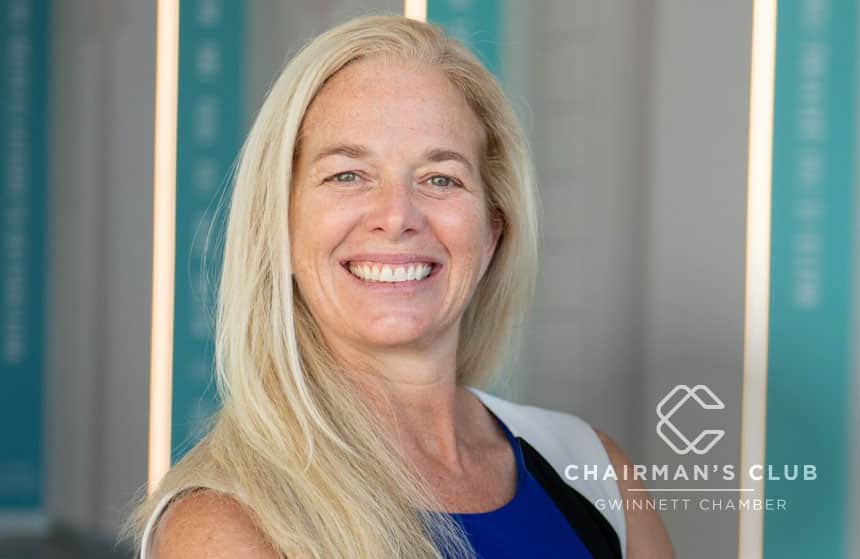Water is one of the world’s most precious resources, and Chairman’s Club member Melissa Meeker has dedicated her career to ensuring its sustainability. As CEO of The Water Tower — a global water innovation center in Buford — Meeker leads research, technological advancement and workforce development that benefits Gwinnett County and the entire water industry. The Water Tower serves as a hub where public and private organizations collaborate to improve water quality, safety, efficiency and resilience. “Water utilities are critical to life and economic development — from product manufacturing and the water-energy nexus to delivery in local communities,” Meeker says.
A Cutting-Edge Facility for Real-World Solutions
Wedged between the F. Wayne Hill Water Resources Center and the Gwinnett Environmental & Heritage Center on a 200-acre campus, The Water Tower offers a unique environment for water-related research and innovation. With state-of-the-art laboratories and live water feeds from the neighboring wastewater treatment center, it provides opportunities for companies and researchers to experiment in real-world conditions. “Companies can hook up to one of our different water quality feeds and test new technologies, train teams or demonstrate new devices to potential customers,” Meeker explains.
Since opening about two years ago, The Water Tower has welcomed thousands of visitors from across the United States and dozens of other countries, showcasing the latest in water innovation. Meeker’s team also hosts research teams from Georgia Tech, the University of Alabama, Georgia Gwinnett College and other esteemed organizations.
Building the Next-Generation Workforce
The water industry faces a major challenge as nearly 50 percent of its workforce is at or near retirement. Many people are unaware that they can build a solid career in this sector with starting salaries of $50,000 or more and a high school diploma or GED. “The job need is there in every one of our communities, and our organization provides training to fill those roles,” Meeker says. The Water Tower also offers free gear and job placement assistance, helping meet the growing need for qualified water professionals.
Meeker is committed to increasing diversity in an industry that has historically underrepresented women and minorities. “We believe water utility careers provide an amazing opportunity for previously underserved segments of our communities. Engaging, training and placing individuals from these segments will help make our communities more resilient by giving families opportunities they didn’t know existed,” she says.
The Role of Technology in Water Management
Advancements in technology are reshaping how water is managed and protected. For example, water testing in the field used to require collecting samples and waiting days for lab results before issuing public advisories. The Water Tower is conducting research on alternatives, like a hand-held microscope and mobile identification apps that enable field technicians to analyze samples in about 10 minutes, significantly speeding response times and protecting public health.
Artificial intelligence is also changing the industry. “AI-driven predictive analytics help utilities be more proactive in maintenance programs,” Meeker explains. “Much of the water infrastructure is underground, making it difficult to detect problems before costly water main breaks and service disruptions. AI technologies can alert utilities to potential issues before they escalate.”
From Government Leadership to Industry Influence
Meeker’s extensive background in the water sector prepared her for her role at The Water Tower. She previously held leadership positions in Florida’s water industry and was appointed by the state’s governor to lead the South Florida Water Management District. In that role, she oversaw water resources stretching from Disney World to Key West, managing supply, flood control and environmental protection initiatives. She has also testified before Congress on critical water issues, lending her expertise to national policy discussions.
Since relocating from Washington, D.C., to lead The Water Tower, Meeker has relied on the Gwinnett Chamber to establish connections. She also appreciates the Chamber’s role in keeping members informed about legislative decisions that impact their industries. “The Gwinnett Chamber has been a fantastic way to meet my peers, network and stay informed about what’s happening in Gwinnett County and beyond,” she says.
Flowing Into the Future
Meeker sees Gwinnett as a prime location for business growth. “The state and Gwinnett County offer an excellent business environment with favorable tax policies and room for expansion,” she says. The presence of top-tier universities also ensures a strong pipeline of talent for the water and life sciences industries.
She encourages business and nonprofit leaders to explore The Water Tower as a resource. In addition to research and workforce training, the facility offers meeting spaces for events, and undeveloped space is available for water-related businesses looking to establish a presence in the region.
After investing decades in water preservation, Meeker hopes everyone understands that water is fundamental to every aspect of our lives. She says, “It’s easy to take water for granted because so much of the infrastructure is out of sight. But we all have to do our part — whether that’s supporting responsible projects or just being aware of what touches our water. It takes everyone’s help to protect this vital resource.”





